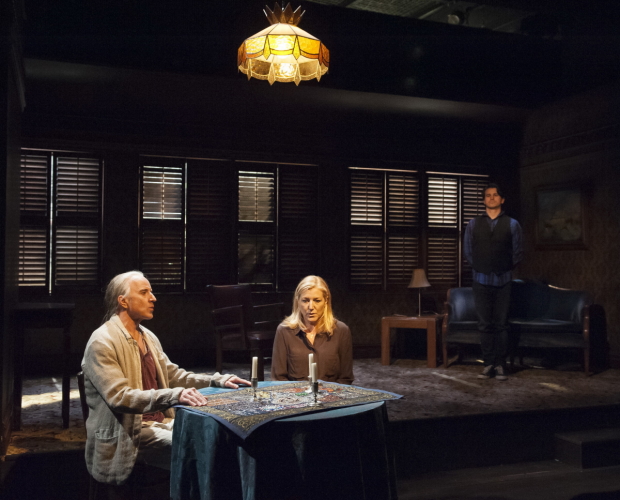Ghost Stories: The Shawl and Prarie du Chien

(© Ahron R. Foster)
A great play by David Mamet is exhilarating. A bad play by David Mamet is excruciating. Ghost Stories, a pair of one-acts from 1985, falls squarely in the middle of those two extremes. Ghost Stories, now receiving its first New York revival at Atlantic Theater Company's Stage 2 under Scott Zigler's direction, is neither earth-shatteringly good nor mind-numbingly terrible — it just is.
First on the bill is Prarie du Chien, originally an NPR radio play in 1979 that Mamet later adapted for the stage. The setting is a night train speeding along to Duluth in 1910. On one side, two men (Nate Dendy and Jim Frangione) play a contentious game of gin. On the other, a father (Jason Ritter), with his son (Henry Kelemen) sleeping in his lap, listens as an unnamed fellow passenger (Jordan Lage) tells a story that has haunted him for some time.
Featuring dim lighting by Jeff Croiter and almost no movement from the actors, Prarie is a soporific affair, one that unintentionally lulls the audience into drifting off as the sound of a railroad car rattles on the tracks. Overall, it's less a play than a writing exercise, one that would likely benefit from being listened to via headphones than actually watched live.
After intermission is The Shawl, first staged in Chicago in 1985 before being combined with Prarie for an off-Broadway mounting at Lincoln Center Theater. It's a tale of a middle-aged mystic (Arliss Howard) attempting to con a grieving woman out of money, ostensibly to keep his conniving young lover (Ritter, back for round two) happy. But things aren't always what they seem, and Mamet skillfully keeps the audience in the dark about motivations and the ponytailed soothsayer.
With a compelling story and three layered characters, The Shawl offers significantly more drama than the curtain-raiser, but it still lacks a crucial element of technical precision. Director Zigler is a frequent Mamet collaborator, having staged several of his plays in New York and elsewhere, but his work here doesn't show mastery in helping to make the playwright's signature clipped dialogue sound natural in the mouths of the actors. That rat-a-tat writing for which Mamet has become known can never be allowed to hit as hard as it should when the performers pause rather than jump right in on top of the last sentence.
In general, Howard fares best, delivering an intriguing, deeply conflicted performance as a phony clairvoyant torn between honesty and physical desire. Also persuasive are the card players in Prarie, who say extremely little but provide a full, satisfying arc of emotion in their facial expressions. In minuscule roles, one wonders why TV vet Ritter, last seen onstage in the original production of Wendy Wasserstein's final play, Third, chose this vehicle to mark his return. Ritter does what he can to make his work engaging, but there's to be done when both of his characters passively listen and contribute nothing to the rising and falling action. Lauren Helpern provides a versatile set that makes you cough as you imagine cakes of dust, while Linda Cho's striking costumes run the gamut from woolen 1900s wear in the first one-act to 21st-century street clothes in The Shawl.
There's an inherent problem with billing these two plays as Ghost Stories, in that neither of them is particularly scary. When one thinks of ghost stories, one imagines sitting around a campfire trembling from tales of unmistakable horror. Unfortunately, the best they can muster up here is a shrug.











